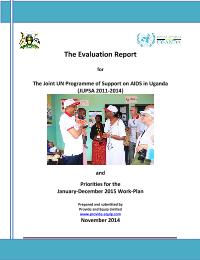
Final evaluation of UN Joint Programme on HIV and AIDS
Completedon 17 Nov, 2014
Evaluation Plan
Planned End Date
Dec 2014
Evaluation Type
Outcome
Management Response
Yes
Evaluation Budget
$40,000
Summary
SUMMARY
In 2007, the UN in Uganda responded to the UN reform to improve its effectiveness, relevance and coordination to position UN as a strategic partner to the national AIDS response. Hence the Joint United Nations Programme of Support on AIDS (JUPSA) was established in 2007-2012 and a Joint UN Team on AIDS set up to oversee and monitor its implementation. JUPSA was aligned to UNDAF 2010-2014; The National Development Plan (2011-2014); The National HIV Strategic Plan (2011/12-2014/15) and to priority areas in the UNAIDS vision on getting to Zero New Infections, Zero AIDS-related Deaths and Zero Discrimination. JUPSA provides upstream support; it is a coordination mechanism for UN agencies to support HIV and AIDS interventions, and hence JUPSA is not a direct implementer.
The overall objective of the evaluation was to undertake an in-depth analysis of the JUPSA Programme in order to generate comprehensive and specific evaluation feedback on the implementation of the Programme. The evaluation findings informed priorities for the January ? December 2015 Bridging Work Plan.
LESSONS LEARNT
I. The JUPSA model facilitated scaling up the resource envelope through pooling of funds and employing a coordinated approach to the HIV and AIDS response; thus minimises duplication of interventions and increases efficiency as well as effectiveness.
II. The re-engagement of parliament, political, religious and cultural leadership yields stronger political will and better results.
III. The establishment of the JSC that involves the government, private sector, the UN, development partners and PLHIV fosters national ownership of the JUPSA and collaboration for its delivery.
IV. Limited involvement of the government at district level in the initial planning processes of JUPSA interventions leads to limited ownership of the programs, hence may limit its sustainability.
V. Delays experienced by the UN system; followed by delays from government and other implementing partners system creates ?multiple delays? which is not desirable.
Evaluation Title
Final evaluation of UN Joint Programme on HIV and AIDS
Plan Period
Status
Completed
Type
Outcome
Plan Date
1 Dec, 2014
Completion Date
17 Nov, 2014
Budget
$40,000
Expenditure
$0
Source of Funding
HIV JP UN agencies
Management Response
Yes
Quality Assessment
No
Joint Programme
No
Joint Evaluation
Yes
Joint With UNDP;UNAIDS;WHO;ILO
GEF Evaluation
No
Stakeholders
AMICAALL;Uganda Aids Commission;UNASO; Ministry of Health; MoH, Ministry of Gender ;
Countries
Uganda
Plan Period
Status
Completed
Type
Outcome
Management Response
Yes
Plan Date
1 Dec, 2014
Quality Assessment
No
Completion Date
17 Nov, 2014
Joint Programme
No
Joint Evaluation
Yes
Joint With UNDP;UNAIDS;WHO;ILO
Budget
$40,000
GEF Evaluation
No
Expenditure
$0
Stakeholders
AMICAALL;Uganda Aids Commission;UNASO; Ministry of Health; MoH, Ministry of Gender ;
Source of Funding
HIV JP UN agencies
Countries
Uganda


